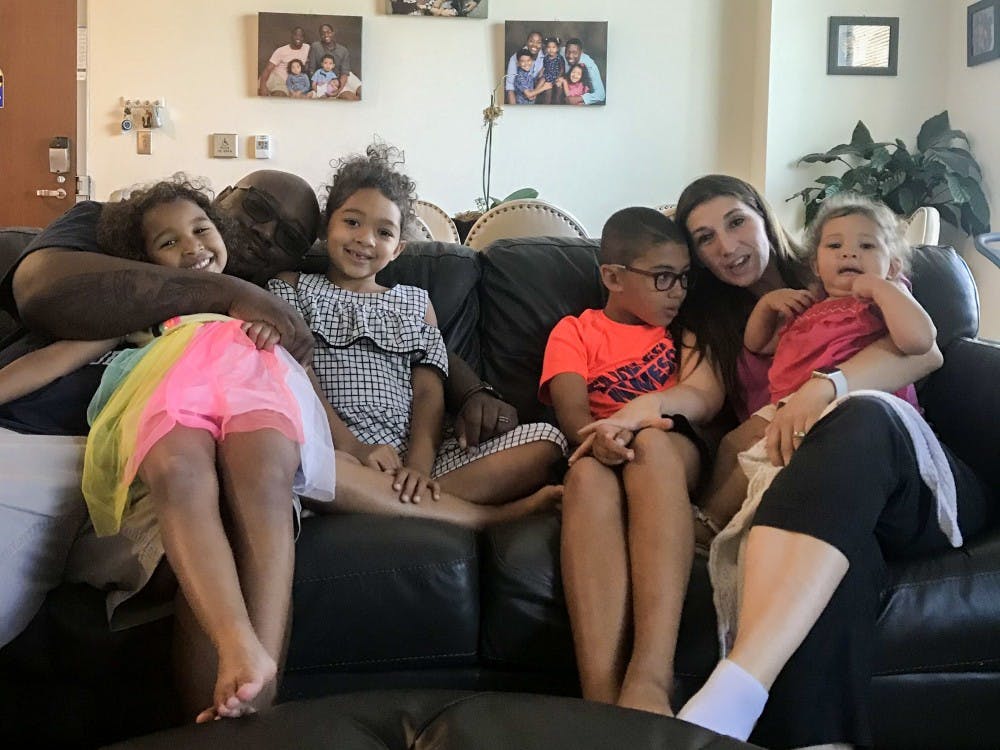Things get lonely on an empty East Campus. Just ask the faculty-in-residence.
FIR and their families live in first-year residence halls to encourage interaction between students and faculty outside the classroom. They host events to bring residents together, something increasingly difficult to achieve in the wake of Duke’s coronavirus response as all students have moved out of East Campus residence halls.
John Blackshear, dean of academic affairs, associate vice provost for undergraduate education and an adjunct instructor in psychology and neuroscience, lives in Trinity residence hall with his wife, Kimberly—assistant director of programs for Family Connects International in the Center for Child and Family Policy—and four children. For John, virtually connecting with his residents through weekly “Sunday Hangs” has become an integral part of his day.
“I don’t think there has been a day where we haven’t had at least a conversation with a student,” he said. “It’s been really nice just seeing the faces again.”
Gabriel Rosenberg, associate professor of history and gender, sexuality and feminist studies, lives in Southgate residence hall with his husband. They typically host a weekly event called “Cookies 101,” featuring conversation and freshly baked cookies, on top of other events like escape room trips.
It’s these events that Rosenberg has struggled to translate into a virtual format for dorm residents who are scattered around the world.
“It’s ground to a halt most things that I think students value in the program and that faculty uniquely contributed to it. I’ve been able to sustain some communication and contact with residents of my dorm through Zoom and stuff like that, but it hasn’t been particularly regular and I don’t know that it’s an adequate replacement,” Rosenberg said.
Rosenberg also pointed out the irreplaceability of face-to-face contact, saying that valuable non-planned and spontaneous conversation is changed or lost “under the auspices of a Zoom conversation.”
John Blackshear said students’ presence is a valuable part of a dorm’s identity.
“The spirit of the dorm belongs to the students that live here. And without you guys here, these are just big old buildings,” he said. “This has highlighted, I hope, that there’s something quite meaningful in proximity.”
Christine Folch, assistant professor of cultural anthropology, has lived in Randolph residence hall for three years, welcoming students into her home for “Meet Up Monday” events, guest speakers and even her son’s second birthday party.
On her mind is the future of the FIR position, including FIR’s responsibilities in the wake of the pandemic.
“Part of what we’re going to do is have to have a space where students can reflect on the world that they’re living in, and that means a post-pandemic world,” Folch said. “I think that’s going to mean speakers, discussion topics.”
She said she hopes to be available and remain a link for current Randolph residents as they become sophomores.
Above all, FIR mourned the loss of the rest of the semester, of events missed and conversations not had.
“I’m sure the students themselves are disappointed for all their various reasons, but I selfishly really loved the cohort this year,” Folch said. “It was just really fun to be a part of this community this year and we had [a] vision for how to finish well, spending time, being intentional with one another, and instead what happened is people had to be scattered. And that feels like a loss.”
Get The Chronicle straight to your inbox
Signup for our weekly newsletter. Cancel at any time.

Preetha Ramachandran is a Trinity senior and diversity, equity and inclusion coordinator for The Chronicle's 118th volume. She was previously senior editor for Volume 117.

